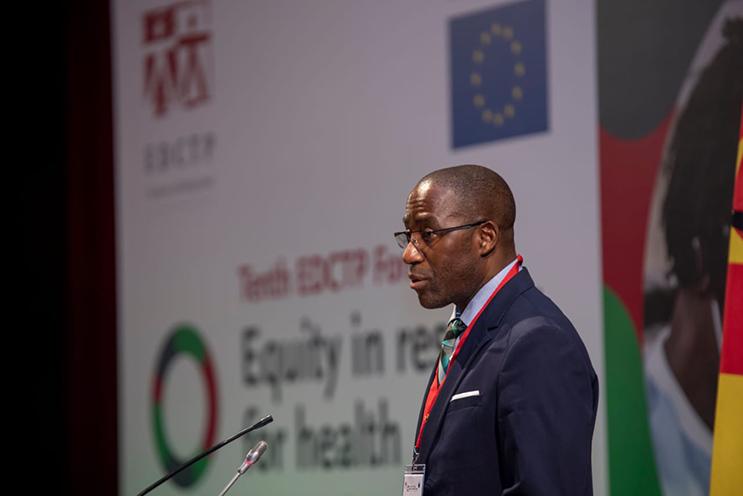By Paul Chinnock
The Tenth EDCTP Forum, focusing on Equity in Research for Health, is under way. Looking at the comments appearing on today’s live-streamed meeting, it is clear that everyone is pleased to be a part of the proceedings. While only around 30 delegates were present in person at the event in Maputo, another 1900 have registered to participate online. In these pandemic times, that is quite an achievement.
After a stirring opening, provided by the drummers and dancers of Associação HODI, delegates were shown a short film in Portuguese – Images from Mozambique: Land of Contrasts. Not only did this feature the scenery and food of the country, but also its development and the steps it is taking against HIV/AIDS, malaria and TB. The importance of research in identifying solutions to these and other health issues (including mother-and-child health and non-communicable diseases) was also featured, as was an acknowledgement of the support received from EDCTP.
Delegates were welcomed by Leonardo Simão, who is Chair of the local organising committee as well as being EDCTP High Representative for Africa. He expressed his personal satisfaction that the Forum was taking place in Mozambique. His country believes in scientific research and is committed to its advance within Mozambique, although this is still at an early stage. Mozambique is a member of EDCTP, where it is represented on its General Assembly. He highlighted the role in the development of EDCTP that had been played by Pascoal Mocumbi, whose name has been given to the highest award now offered by EDCTP, to be presented on Monday.
He reminded his listeners that EDCTP is focused on the priority needs of Africa and it has accelerated the development of interventions targeting HIV/AIDS, malaria and TB, neglected infectious diseases, and also respiratory infections and diarrhoeal diseases. The Forum will present and discuss new clinical studies and address the issue of capacity development. Equity is at the centre of EDCTP’s mission, and the current pandemic makes even more urgent the need to address this issue.
He thanked his local colleagues for organising the Forum and hoped they would continue their efforts with the same level of energy once the event is over.
After another short film, which described health research activities in Mozambique, delegates were also welcomed by Moses Bockarie, Organising Committee Chair and EDCTP’s Director of International Cooperation and head of EDCTP’s Africa office. He expressed his delight in being able to be present in person. The Forum had been postponed by one year, due to COVID-19, and there had been doubts whether it would be possible to hold it this year. But the decision had been taken to hold a hybrid meeting. While this would have some limitations, steps had been taken to make it possible for delegates attending virtually to interact with each other and enjoy the event together. He noted that Mozambique is making a significant contribution to research and he was pleased that it was hosting the Forum.
His Excellency Armindo Tiago, Minister of Health of the Republic of Mozambique, added his welcome. He stressed that infectious diseases continue to represent a major threat in sub-Saharan Africa (SSA) and now COVID-19 has brought additional pressures. Since its launch, EDCTP has shown itself to be an important force in developing new interventions. It has helped in the battle against HIV/AIDS, malaria, TB and also COVID-19. It has also created important links between Africa and Europe. EDCTP has provided support to Mozambique: to its National Health Institute (INS), the Manhiça Health Research Centre (CISM) and in the development of its national regulatory authority.
Mozambique has made important achievements in poverty reduction. Life expectancy and other measures have improved. It must now be ready to face the multiple burdens of existing and emerging diseases. The pandemic has shown that African countries must take advantage of new technologies and advance their health systems. This will help build resilience in our society.
Partnerships are important in global health. Mozambique is pleased to be in partnership with EDCTP but it now challenges the organisation to address further technical hurdles including national medicine production. Human resources still need the attention both of governments and EDCTP. He called for the establishment of an enabling environment for health research. He hoped the Forum would achieve its intended results for all the participants.
Another video was then shown in which a number of Mozambican researchers described the backing they had received from EDCTP, including support for INS, malaria research, career development (especially for women researchers) and the creation of bio-ethics committees.
The session then continued with a roundtable discussion – see next blog.

